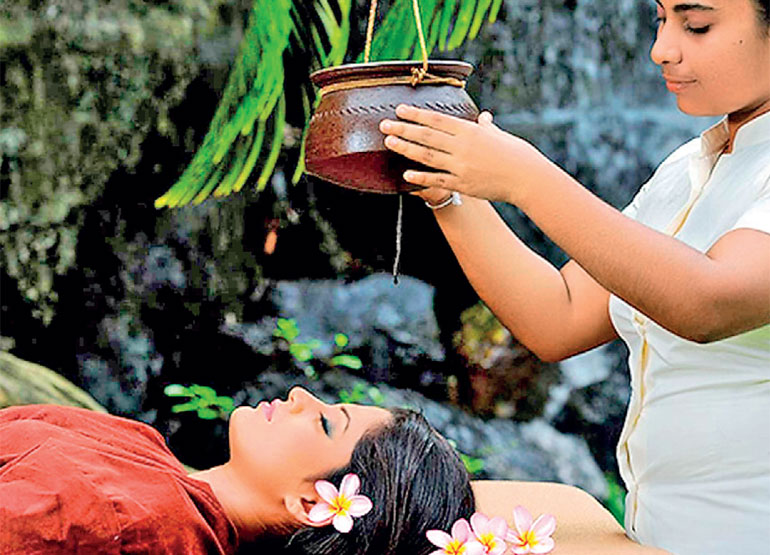Monday Feb 23, 2026
Monday Feb 23, 2026
Thursday, 25 August 2022 00:03 - - {{hitsCtrl.values.hits}}

 Sri Lanka as many know is a beautiful island nation with a myriad of natural resources and ecstatic sceneries. Famed for the hospitality of the friendly people, the country has a lot more to offer than just delicious food, lavish lodgings, adventurous nature trails, and the green-blue seas.
Sri Lanka as many know is a beautiful island nation with a myriad of natural resources and ecstatic sceneries. Famed for the hospitality of the friendly people, the country has a lot more to offer than just delicious food, lavish lodgings, adventurous nature trails, and the green-blue seas.
Sri Lanka presently is going through a grave financial crisis of which the repercussions are viciously experienced by many citizens. The inability to bring forex into the country has contributed massively to its downfall.
How can we as medical professionals contribute during a forex crisis? Besides the short and medium-term plans that encourage many foreign donations to the country, shouldn’t we also look for a long-term plan to survive and raise ourselves once again?
The island has one of the best education systems in the world and delivers skilled professionals to many industries. Sri Lanka’s medical professionals are considered to be highly skilled and I as a medical professional myself feel that there are endless possibilities for us to serve the country if the right opportunities are created.
Tourism is a major contributor to forex but what about health tourism which is one of the largest growing segments of wellness and medical tourism?
What is health tourism?
Health tourism is a concept that allows people to travel to different countries to receive health services to increase their quality of life, enabling them to improve their physical and mental wellbeing.
Health tourism allows you to engage in activities, treatments, and therapies that benefit your health and contribute to a healthier physical, mental, and spiritual health.
Why is health tourism becoming a popular segment?
What are the benefits of health tourism?
It’s the perfect getaway for tourists to receive affordable and cheaper healthcare services without compromising quality.
Why should Sri Lanka contribute to creating a health tourism segment?
What treatments can we offer?
What is stopping us now?
I must frankly admit that to cater to the health tourism sector, the government hospitals may need more time to implement structures, more disciplined procedures, and patient-friendly lodgings and environment. With the lack of funds, this might seem a difficult task at a time like this, but health tourism is easily accessible to private hospitals and treatment centres.
With a bit of “out of the box” thinking, the private sector has the resources and the capability to cater to a professional health tourism industry.
What we are capable of offering
A change of attitude will make us ready to serve a wider community
No matter how skilled or specialised our professionals are, there are a few obstacles we are yet to overcome for us to open our beautiful country for health tourism. We need to get together as a team and turn a new leaf, ensuring that we are confident and offer professionalism in every aspect that assures the patient’s convenience and comfort.
1. The country should offer a simple visa procedure and allow hassle-free entry for the visitors.
2. Over the years as a medical practitioner, I have noticed that the private hospitals in Sri Lanka don’t quite meet the required standards and quality of patient care. I sometimes wonder if the private sector is far too commercialised and concerned only about earning money and not patients’ welfare. Are the medical support staff trained and experienced enough to care for patients, and to assist with their wants and needs? Are the patient rooms comfortable and clean? Does a patient still need to complain about the available facilities even after paying money to obtain services? The specialised skilled services surely require to be more structured and organised.
3. Of course, I understand that private hospitals are a business aimed at earning profit. But, is the management utilising enough profit to benefit the patients and their comfort? Most private hospitals are not equipped with modern or advanced technology on par with standard treatments, especially when it comes to cardiology and perhaps in other areas too. Shouldn’t we address this? Our private hospitals need improvement in comparison with neighbouring countries like Maldives, India, Singapore, etc., that have excelled in health tourism.
I kindly urge relevant tourism authorities, the Ministry of Health, medical professionals, and private health caregivers to consider these views and create opportunities to implement a growing and nourishing health tourism sector in Sri Lanka that will enable to bring the much-required forex to the country.
(The writer is a Consultant Cardiologist, Institute of Cardiology, at the National Hospital of Sri Lanka.)